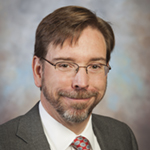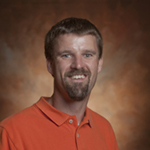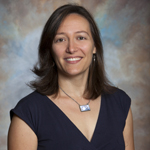By Katie Neitz
Every day, 2.5 quintillion bytes of data are produced. And the volume and speed at which that is happening will only grow.
This has fueled demand for people who can capture, analyze, and generate insights from the ever-increasing amount of numbers and figures. Data scientists blend the worlds of mathematics and statistics with computer science to create predictions and make sense of trends occurring in various other fields, from economics and marketing to biology and psychology.
Recognizing the expanding influence data has on society—and the growing need for educated people who can make sense of it all—a team of Lafayette faculty members has been working together to explore how data-science pedagogy can have a greater presence on campus.

John Meier
“I think data literacy is a critical thing for citizens to have,” says John Meier, professor of mathematics. “How do you wrangle massive amounts of information and arrive at a sound decision? It’s important to be able to understand how data is collected, presented, and interpreted. I think that as a liberal arts institution, it’s important for us to be discussing this digital scholarship.”
To engage the Lafayette community in this conversation, Meier and other members of the digital scholarship and data science (DSDS) strategic planning group invited three noteworthy data-science scholars to speak on campus in early September. The speakers shared their insights on data science as a liberal art and how it can play a vital role across many fields of study.
 Keynote speaker Sam Wang, a professor of molecular biology and neuroscience at Princeton University, addressed how gerrymandering, a practice of drawing district boundaries to give a political advantage to one party over another, can be remedied using statistics. Brittany Fiore-Gartland, director of data science ethnography at the eScience Institute at University of Washington in Seattle, discussed the ethical challenges of data science. Nick Horton, professor of mathematics and statistics at Amherst College, spoke about innovative ways to teach statistics. The three also participated in a panel discussion about data science as a liberal art.
Keynote speaker Sam Wang, a professor of molecular biology and neuroscience at Princeton University, addressed how gerrymandering, a practice of drawing district boundaries to give a political advantage to one party over another, can be remedied using statistics. Brittany Fiore-Gartland, director of data science ethnography at the eScience Institute at University of Washington in Seattle, discussed the ethical challenges of data science. Nick Horton, professor of mathematics and statistics at Amherst College, spoke about innovative ways to teach statistics. The three also participated in a panel discussion about data science as a liberal art.

Trent Gaugler
“I was really encouraged by the attendance at these events,” says Trent Gaugler, assistant professor of mathematics. “I think that there is strong interest on campus, due largely to the fact that data science is fundamentally interdisciplinary at its core. Statisticians and data scientists wouldn’t have jobs without data from psychologists and economists and English literature scholars. And increased computing power is advancing what can be done every day.”

Jennifer Talarico
Members of the DSDS group are writing recommendations for the Office of the Provost about how data-science pedagogy can be integrated at Lafayette. Jennifer Talarico, associate professor of psychology, says the insight the guest speakers provided will help them prepare their proposal.
“It was valuable to gain perspective from other institutions to help us gauge what might work best here,” she says. “Should data science be an interdisciplinary minor/major available to students, a course-level attribute offered as part of the Common Course of Study, or taught via a workshop-type model that might operate like our existing Writing Associates within the College Writing Program? There are a number of ways it could be implemented, and we need to find the best fit for Lafayette.”
The College has already shown a commitment to furthering digital scholarship. Plans for the future Rockwell Integrated Science Center include a data-visualization lab. And in 2013, Lafayette received a four-year, $700,000 grant from The Andrew W. Mellon Foundation to further learning and coursework in the digital humanities.
“This is a field that is moving really fast,” Meier says. “The value in statistics and data science is no secret. I think that as the College expands its interests and faculty, it’s good to think about strategic ways to incorporate data science that align with our mission and history. Because we embrace multidisciplinary work and value opportunities to connect theory with practice, we are in quite a good position to stay on the front end of this movement.”

 Keynote speaker Sam Wang, a professor of molecular biology and neuroscience at Princeton University, addressed how gerrymandering, a practice of drawing district boundaries to give a political advantage to one party over another, can be remedied using statistics. Brittany Fiore-Gartland, director of data science ethnography at the eScience Institute at University of Washington in Seattle, discussed the ethical challenges of data science. Nick Horton, professor of mathematics and statistics at Amherst College, spoke about innovative ways to teach statistics. The three also participated in a panel discussion about data science as a liberal art.
Keynote speaker Sam Wang, a professor of molecular biology and neuroscience at Princeton University, addressed how gerrymandering, a practice of drawing district boundaries to give a political advantage to one party over another, can be remedied using statistics. Brittany Fiore-Gartland, director of data science ethnography at the eScience Institute at University of Washington in Seattle, discussed the ethical challenges of data science. Nick Horton, professor of mathematics and statistics at Amherst College, spoke about innovative ways to teach statistics. The three also participated in a panel discussion about data science as a liberal art.
